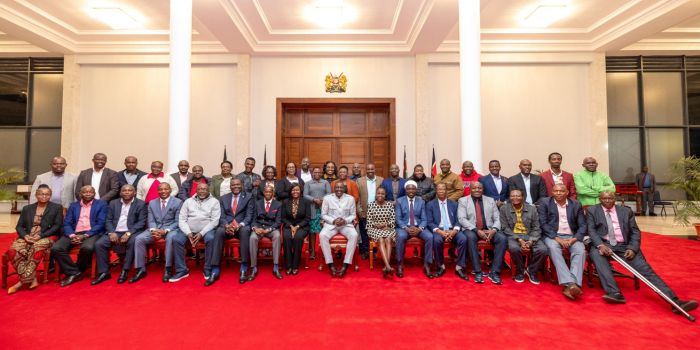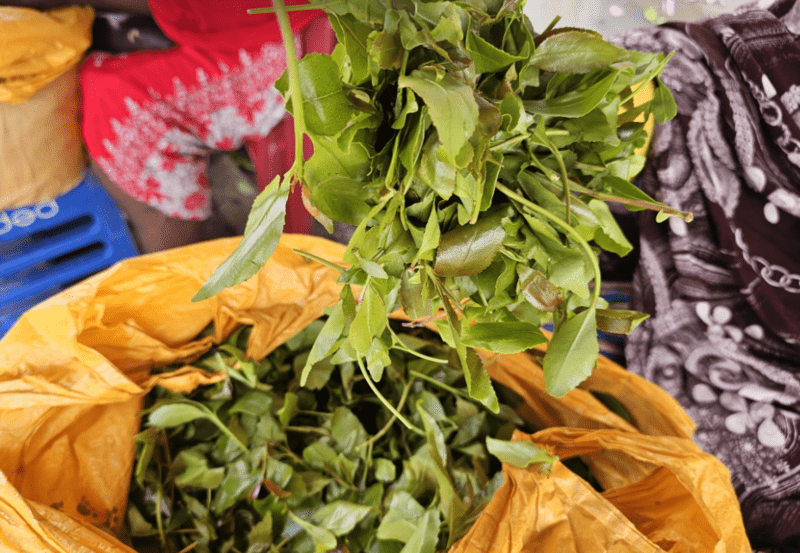Ruto nullifies muguka ban, calls consultative meeting

President Ruto noted that while the government is committed to the fight against drugs, illicit brews, and other illegal substances, muguka is recognised by national law.
President William Ruto has declared the muguka ban by several counties null and void and directed the Agriculture ministry to convene a consultative meeting of key stakeholders to discuss their concerns.
Thus far, three coastal counties—Mombasa, and Taita Taveta—have banned the sale, distribution, and use of muguka as part of regional efforts to curb abuse in the coast region.
More To Read
- Kilifi North MP Owen Baya withdraws controversial Muguka Bill after DP Kindiki meeting
- Muguka farmers face uncertain future as new Bill seeks delisting
- Pharmaceutical Society opposes amendments to Narcotic Drugs Bill
- How Muslim clerics are helping members stay away from drug abuse
- Ruto's pledge as meeting with Coast leaders over muguka ban finally takes place
- Education stakeholders back Mombasa's muguka ban
Ruto's directive came on Monday, after a meeting at the State House in Nairobi with leaders from Embu County, led by Governor Cecily Mbarire. Agriculture Cabinet Secretary Mithika Linturi was also present.
The president noted that while the government is committed to the fight against drugs, illicit brew, and other illegal substances, muguka is recognised by national law.
"Any other law or order that contradicts national legislation is null and void," he asserted in a statement on Monday night.
He asked the Agriculture ministry to convene a meeting of leaders of counties that have banned muguka, those that grow it, and relevant stakeholders to address emerging concerns over the stimulant.
NACADA's position
Where substance abuse is concerned, the National Authority for the Campaign against Drug Abuse (NACADA) released a survey in May 2023 that listed miraa (also known as khat) and its variant, muguka, among the top drugs of abuse in Kenya.
The survey estimated that more than 960,000 people, among 15- to 65-year-olds, use the two commodities.
Then NACADA chief executive Victor Okioma emphasised the severity of the issue, noting that some individuals were undergoing rehabilitation specifically for miraa use. He pointed out that, while miraa itself is problematic, muguka poses an even greater threat.
"Our studies have shown that muguka falls under the Narcotics, Drugs, and Psychotropic Substances Act as a harmful substance," Okioma stated.
Kenya, as a member of the United Nations, is committed to aligning its laws with international standards to prohibit the use of harmful substances such as miraa.
"NACADA's position is that miraa is harmful, and muguka is even more harmful. This is why we are discouraging the expansion of markets and are against attempts to process it into juices and wine," Okioma explained.
He added a crucial caveat: "Unless they have found a way of removing the harmful constituents, we will oppose it."
I have held a productive meeting with the leaders of Embu County on the recent ban on muguka. We have agreed that miraa/muguka being a scheduled crop, a meeting be convened to discuss the issue.
— William Samoei Ruto, PhD (@WilliamsRuto) May 27, 2024
Consequently, I have directed the Ministry of Agriculture to convene a forum of all… pic.twitter.com/592jkrr78N
Next steps
In his address to the State Hous meeting, Linturi noted that muguka is grown in line with the Crops Act 2013 and the Miraa Regulations of 2023.
"The Crops Act 2013 and the Miraa Regulations of 2023 were passed by the National Assembly and the Senate and with the concurrence of the Council of Governors," the statement noted.
"Having been passed by Parliament, the regulations obligate the government to allocate funds for the farming, licencing, promotion, regulation, transportation, aggregation, selling, marketing and export of the crop.
The statement added that the CoG had already nominated three members to the Miraa/Muguka Pricing Committee to operationalise the act.
The State House also announced that the government had set aside Sh500 million to scale up farming, aggregation and value addition to scheduled crops such as muguka and miraa in the 2024–2025 financial year.
 Muguka on sale in Eastleigh, Nairobi, in this file picture. (Photo: Abdirahman Khalif)
Muguka on sale in Eastleigh, Nairobi, in this file picture. (Photo: Abdirahman Khalif)
Embu's concerns
Ruto's move comes as a surprise to governors who had banned the stimulant in their counties and were not present at the State House meeting.
They include Mombasa’s Abdulswamad Sherrif Nassir, who issued an executive order banning muguka’s sale and distribution and closed all its outlets, and Kilifi’s Gideon Mung'aro, who issued a similar executive order and directed all enforcement officers to ensure its full enforcement.
Taita Taveta Governor Andrew Mwadime also did not attend the meeting.
The ban by the three coastal counties had faced opposition from Embu, which said it would sue, arguing it could significantly impact its local economy, which earns approximately Sh22 billion annually from the sale of muguka.
Governor Mbarire had expressed dissatisfaction with the ban, noting that it came after she met with Mombasa Governor Abdulswamad Sheriff Nassir on May 15, 2024, a meeting which established a joint working team to ensure compliance with the product's trade regulations and address issues raised by Mombasa.
In Kwale, some residents had asked their governor, Fatuma Achani, to prohibit the sale and consumption of muguka in the county. They applauded Governor Abdulswamad and asked Governor Fatuma to emulate him.
On Monday evening, the Supreme Council of Kenya Muslims (SUPKEM) weighed in on the matter, calling for a ban on the sale, distribution, and use of the stimulant in Garissa County.
Garissa leaders opposition
Garissa leaders have already called for a ban on the sale, distribution, and use of muguka, and want the county to join Taveta, Kilifi, and Mombasa counties in the fight against drug abuse.
Hajir Mohamed Dahiye, a Member of the County Assembly, said total control and restrictions on the sale and consumption of drugs in the county are required.
He is proposing a bill which fronts harsh penalties for those found contravening the law and seeks to regulate the trade if it sails through the County Assembly.
"Our laid down rules and proposal has the support of County Assembly members and locals," he said.
"A total ban of miraa and muguka is required because consumption has been linked to various health issues, including mental health problems, cardiovascular issues, and addiction," the county legislator told The Eastleigh Voice.
Hajir said muguka and miraa have contributed to social problems like family breakdowns and decreased productivity.
Sheikh Hassan Abdi Abdullahi, an official of the Supreme Council of Kenya Muslims (SUPKEM) Garissa branch, said the body strongly opposes the consumption and sale of muguka in Garissa County.
"From a religious and moral standpoint, we believe that muguka has detrimental effects on both individuals and the community," he said.
Sheikh Hassan said its consumption leads to behaviours and conditions that are contrary to Islamic teachings.
He said the use of stimulants does not align with the teachings and principles of Islam.
"Islam promotes the well-being of the individual and the community, and prohibits substances that impair judgement, harm the body, or lead to addiction," he added.
The religious leader said the consumption of stimulants has been harmful and contrary to the principles of moderation and self-control that Islam advocates.
Former Lagdera legislator Mohamed Shidiye said he supports the proposed ban on muguka in Garissa.
"The main reasons for this support include the harmful health effects of muguka, and its contribution to social and moral decay," said the former Envoy to Botswana.
He said that to mitigate the economic impact, they propose initiatives to support affected farmers and traders by introducing alternative crop programs and providing small business grants.
These measures, he explained, would help transition those reliant on muguka and miraa to more sustainable and beneficial economic activities.
Garissa County Community Development Watchdog Group chairperson Hassan Gumo said the civil society will work on establishing a support programme for individuals addicted to muguka, including counselling services and rehabilitation centres.
"We plan to involve the community through consultations, public forums, and collaboration with local leaders to ensure their voices are heard and their support is secured," added the rights group head.
Top Stories Today













































